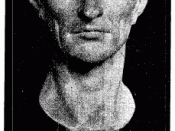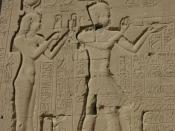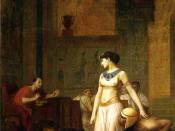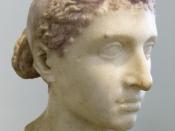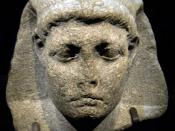The Memoirs Of Cleopatra A Novel By Margaret George St. Martin's Press, New York, 1997 First Edition Laura Rivera November 14, 2001 4th Period 1) "I shuddered. In the next Triumph, Arsinoe would walk in his footsteps, passing before us in defeat. The shame, the unendurable shame of it!"ÃÂ (p.253) Cleopatra at this point has gone through many difficulties during her short reign as queen in Egypt. One of the many things she has gone through is a civil war. Cleopatra's younger brother was pitted against her, and when it seemed like Cleopatra was going to lose, her sister Arsinoe also turned against her by joining the rebellion. At the end of the civil war, Cleopatra, with Julius Caesar's help, defeats her sister and brother's army. Her brother dies trying to escape, but Arsinoe is captured.
Arsinoe is held a prisoner of Rome, and a few years later, Julius Caesar decides to have Triumphs in celebration of his many successful battles.
This includes Egypt. This quote takes place while Cleopatra is watching one of these Triumphs, and it helps me realize how angry Cleopatra was at Arsinoe. Cleopatra was not very found of her sister; she was jealous of her looks and never trusted her. It depresses me to know this because of how close I am to my sister and other members of my family. Royal families of that time were always fighting against each other for power. In this case, Arsinoe lost. It saddens me to think that Cleopatra feels "undurable shame"ÃÂ that one of her sisters is being paraded around as a Roman captive and is going to be executed instead of feeling pain and sorrow for the lost of a family member.
2) "Even as he spoke, his voice was soft and reasonable against the background cries, of wounded men and the shudders of ship timber against timber, I pictured Arsinoe being strangled in the dark, airless stone prison cell. Death in the sunlight and death in the dark- the two kinds of Roman death."ÃÂ (p. 266) This quote is a very good way to explain Romans beyond great engineering, architecture, and conquest. The Romans were much more than just glamour and divinity. They had their dark side too- their sickly pleasure as death.
This quote is stated by Cleopatra right before she leaves a so called "entertainment"ÃÂ that the Romans have put on. In this case, the Romans have built an awesome lake big enough to put real war ships in to depict a naval battle fought in Rome. The problem Cleopatra had, though, was not the fact that this was their choice of entertainment, but the fact that the people really would die while entertaining the public.
The Romans actually had several events where people would play for their lives against animals and each other. There were races where sharp turns would knock over chariots causing their drivers to be thrown off and killed by pounding horse hooves that smashed their ribs or even heads in. When Cleopatra saw the naval battle, though, it pushed her over the edge as it would have for me. This new information I have learned about the Romans has shed some light on the subject of Roman ethics and morals. This quote shows how Romans feel that without death everything is bland. That is Roman death in the sunlight. But there are those who don't deserve the right to be glorified, so they kill them apart, away from mourning eyes, away from sympathy, and away from life. That is Roman death in the dark. 3) "O Roman law! If ever I saw the murderers of my children, I would forget all about the law, except the eternal one of vengeance for a dead child- the prerogative of a mother. Laws can go only so far, and at the crucial moment they fail us. They are a poor substitute for justice."ÃÂ (p. 70) When Cleopatra thinks this, she has just heard that a Roman magistrate turned over the men that killed his two sons to the Roman senate to be judged. Roman law forbids the magistrate from taking action although he easily could have. Cleopatra is surprised by his act that is in the strictest legality, and she thinks the above quote.
I do not agree with her. She is acting with the instincts of a mother, but she is not acting justly. She believes that laws are poor substitutes for justice, but I think they are exactly the opposite. I believe they are justice. Without them there would be anarchy, and where would justice be then? It would be inexistent. Vengeance is sweet, and it may seem that vengeance is the only way a person may ever be happy when a child of theirs is killed. Vengeance is best fulfilled, though, when a person knows they acted better than the person who murdered their child. The only way to be better than the person is to act justly, and that is through obeying the law.
4) "Without further thinking- which would have stopped me- I flung myself overboard. In the instant when I hang, poised, above that blue surface, I felt both terror and victory. And now the water was rushing up at me, and I struck its unforgiving face with a hard force. My body sliced into it and I plunged into the depths, hurtling down so fast that I struck the bottom and bounced up again. All this time I had not breathed, and then my head was shooting out above the surface again, and I took a great, gasping lungful of air."ÃÂ (p. 33) Cleopatra's mother died when she was very young. They were riding in a boat through the Nile when she fell overboard and drowned. Ever since then, Cleopatra had been deathly afraid of water up until she took the dive described in the quote above. Her friends took her on a boat ride. They asked her to come into the water and swim with them. She didn't want to show her weakness. For this reason she jumped into the water and overcame her fear.
This description explains perfectly how and what I felt when I first jumped the high dive at a water park where I used to live in Westerville. All my friends where have a great time jumping from the 15 foot dive. Their flips and "can opener"ÃÂ were dangerously appealing, yet I could not bring myself to climb the ladder and jump. Eventually my friends invited me from the pool to come and jump with them. I could not refuse. Everyone was waiting, looking at me to come and join them. I came with them and made my way slowly to the high dive. I held my breath and climbed and climbed.
By the time I got to the top all I could think about was making that courageous leap into nothingness. And then I did it, I jumped. As Cleopatra put it, I felt terror and victory. The water splashed around me, I touched the bottom and pushed off the pool floor. I had not taken enough air, though, so I quickly found my lungs exploding, begging for air. I opened my eyes and saw the top water a few feet beyond my hands. When it seemed like I could not hold my breath another second, I reached the top, gasping for air like a new born baby. And that is what I was and what I think Cleopatra was. We were both newly born once we overcame our fears.
5) "I decided there must be some way I could celebrate this birth, some way despite Caesar's absence to salute it in an official way. No parades or public festivals; they were too ephemeral. I wanted something substantial, something lasting. I would issue a coin commemorating it."ÃÂ p. 154 Cleopatra bore a son from Julius Caesar whom she called Caesarion. She loved her son very much and wanted greatly for Julius Caesar to accept Caesarion as his son. He wouldn't though because Caesarion had no rights under Roman law, but Cleopatra wouldn't take no for an answer. She tried many things to get Caesar to accept Caesarion. One way she tried to persuade him was to make Caesarion's birth well known and commemorate it; she had the great idea of a coin. Not only is a coin substantial and lasting, it would be something completely out of the ordinary because no woman had ever issued a coin in her right in Egyptian history before. Also, the place for mining coins was in Cyprus. Cyprus was Roman land given to Egypt by Caesar. The Roman government was not too happy about that because Caesar gave it away without consulting them. Though the senate of Rome couldn't do anything, Caesar would be forced to notice the coin and comment about it. When she made these plans, she had all these things in mind; and I think she was very intelligent and thoughtful in coming up with the best way to put her and her son in the best position possible with Rome and the people of her own country.
